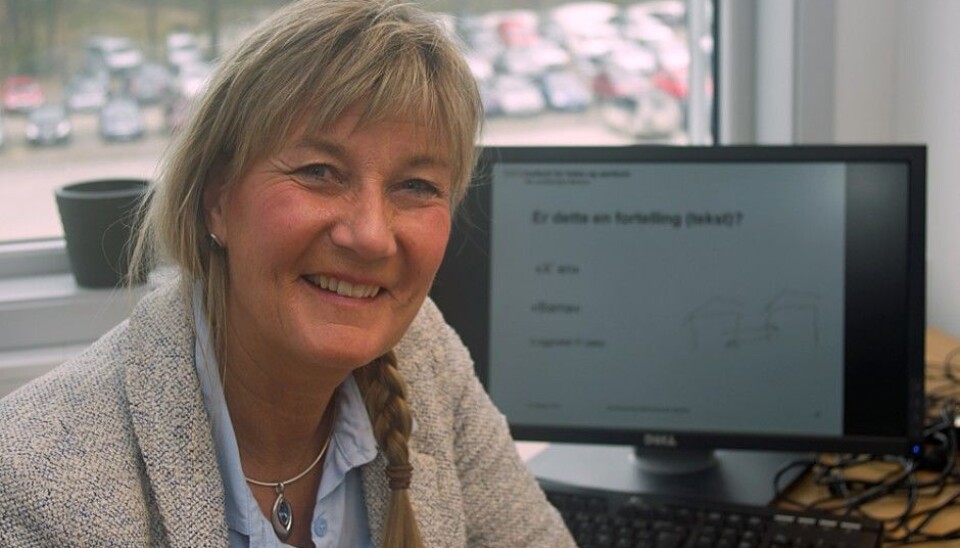
Regaining one’s identity when language goes missing
How can you speak up when language has disappeared? A researcher discovers how aphasia patients can be helped out of depression, anxiety and social isolation.
Denne artikkelen er over ti år gammel og kan inneholde utdatert informasjon.
Being able to tell our stories, about ourselves and others, is integral to maintaining and evolving our identities throughout our lives. Language is our most important tool for those interactions.
What happens when you lose the ability to make sense of life events and experiences through language?
Berit Arnesveen Bronken, an Associate Professor at Hedmark University College, says, “It’s more important than ever to share your story with others when you lose vital functions.”
For her doctoral work, Bronken developed and tested an intervention program for stroke patients. She geared the program to people who were afflicted with aphasia following their strokes. Aphasia is an acquired language disorder caused by brain damage, with language impairment ranging from mild to severe.
The rule rather than the exception

Following on her doctoral work, Bronken, together with several colleagues, is now embarking on a major study to assess the effect of her follow-up program among stroke patients both with and without aphasia.
Language injuries affect about a third of those who suffer a stroke. Reading and writing difficulties after a stroke tend to be the rule rather than the exception.
Rehabilitation often takes a long time, and patients typically find it arduous. When the rehabilitation program is over, they may feel very alone and a long way from being fully recovered.
So the researchers have developed a program that they hope will be a useful supplement to existing rehabilitation services. The program will help patients return to a better life, in spite of all the consequences of a stroke. But it relies on conversations. How can they happen with a patient who has no language?
Body language and communication toolbox
Bronken says, “We use the principles of a method called ‘supported conversation for adults with aphasia.’ These include alternative forms of expression, like photos, customized language, different fonts, highlighting of meaningful expressions and personalized worksheets.”
“We arrange for a conversation with someone who needs to use pointing, objects and other communication aids in addition to words. We’re striving for a normal, adult conversation with people who can’t speak in the same way they did before their stroke,” she says.
Psychosocial implications
Therapeutic options that specifically attend to the psychosocial consequences of a stroke are few and far between.
Patients may drop out of the labour market and develop depression, anxiety and social isolation. They give up leisure activities, and marital problems can arise, affecting spouses and children.
Gabriele Kitzmüller earned her PhD on living with stroke in a family context at UiT Norway's Arctic University. “Communication is central to a family life and is often a major challenge. Many stroke patients are hit by fatigue in addition to language and cognitive difficulties.”
“Stroke survivors may lack the strength to talk about difficult things. They tend to protect those closest to them from stress by not talking about the issues,” she says.
Studying how patients experience what is happening to them isn’t easy. The typical interview format doesn’t work in these cases, and “patients with aphasia are systematically excluded from research projects, because most methods require language skills,” says Bronken.
They have difficulty reading forms and filling out information. And the loss of language skills is a terrifying experience for them.
Bronken says, “They may have been near death, lying unconscious and partially paralyzed, but the worst, according to a patient, was that ‘I couldn’t utter a word. I understood everything they were saying, but couldn’t speak - it was absolutely terrible’.”
Safe conversation
The researchers followed seven patients with moderate to severe language injuries over two years. They conducted 89 meetings and 21 interviews. The interviews were videotaped to capture non-verbal communication and provide a richer interview text.
“The most notable finding was that providing a safe space and someone who could interpret their language gave patients the opportunity to tell their story and share their experiences,” says Bronken. It can be difficult to find time and space for conversation in a hectic schedule if it is not prioritized and scheduled.
Patients are very reluctant to communicate when they do not have a safe space to talk and do not trust the person they are communicating with. Several patients were afraid of being regarded as incompetent or childish. The goal is to empower them so they can face the world outside.
One patient with only a few words, managed to point and communicate with his body that he had gone from being very good at expressing himself, to not having access to words anymore.
Trained nurses serve as companions on the road to recovery. Follow-up from the same nurse throughout the program has proven to be important in building the continuity and trust that facilitate patients’ communication of their experiences and stories.
Large study
Bronken’s doctoral study was too small to draw any conclusions. But now a large study is being conducted, based on the doctoral work of several members of the research team.
The effect of the program will be measured on a larger scale. The study is well underway and expects 400 participants from numerous hospitals throughout Norway.
The program focuses on problematic psychosocial areas from the research literature on strokes. These include: managing emotions around having a life-threatening illness, becoming familiar with a changed body and learning to relate to it, returning to activities of daily life at home, in free time and maybe at work. And not least, working through the identity crisis when faced with no longer having the same proficiencies as before.
“Aphasia is not the intellect. Everyone has a language and a narrative - the challenge is to unpack them when they look slightly different than a traditional narrative,” says Bronken.
---------------------------------------
Read the Norwegian version of this article at forskning.no
Scientific links
- Marit Kirkevold, Randi Martinsen, Berit Arnesveen Bronken og Kari Kvigne: Promoting psychosocial wellbeing following stroke using narratives and guided self-determination: a feasibility study, BMC Psychology February 2014, doi 10.1186/2050-7283-2-4.
- Randi Martinsen, Marit Kirkevold, Berit Arnesveen Bronken og Kari Kvigne: Work-aged stroke survivors’ psychosocial challenges narrated during and after participating in a dialogue-based psychosocial intervention: a feasibility study, BMC Nursing 2013, doi
- Berit Arnesveen Bronken, Marit Kirkevold, Randi Martinsen, Torgeir Bruun Wyller og Kari Kvigne: Psychosocial Well-Being in Persons with Aphasia Participating in a Nursing Intervention after Stroke, Nursing Research and Practice 2012, doi 10.1155/2012/5682
- Berit Arnesveen Bronken, Marit Kirkevold, Randi Martinsen og Kari Kvigne: The aphasic storyteller: coconstructing stories to promote psychosocial well-being after stroke, Qualitative Health Research 2012, doi 10.1177/1049732312450366.



































